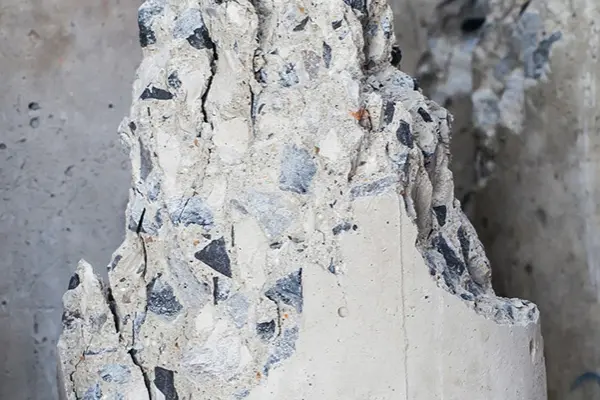
Destructive Testing, the path to durable construction
Concrete Inspection assesses properties of concrete to ensure durable and safe constructions

Destructive Testing, the path to durable construction
Concrete Inspection assesses properties of concrete to ensure durable and safe constructions
Destructive Testing - Concrete
Materials and construction in focus: analyze and evaluate with precision
Destructive testing (DT) is carried out when you want to investigate the concrete's properties, there are several different testing methods. Everything from the concrete's mechanical properties, such as strength, to the concrete's chloride content can be investigated.
How is Destructive Testing, DT, conducted? To make an accurate and realistic assessment of a concrete structure, it often requires testing the properties of the concrete through various destructive tests. Testing can be performed either directly in the structure in the field or by drilling a sample from the structure for further testing in the laboratory.
DT concrete can be divided into four main areas:
- Compressive strength (SS-EN 12930-3). A compressive strength test measures the concrete's ability to resist compression. The result is read in MPa. The method undergoes destructive testing and is performed to assess the strength of the concrete, which is crucial to understanding the overall strength of the concrete.
- Tensile testing (SS 137243 - Concrete testing - Hardened concrete, shotcrete and plaster - Adhesion strength & SS-EN 1542 Concrete constructions - Testing of products and systems for protection and repair - Adhesion strength (pull-out test).
- Surface tensile strength: The test is carried out in order to obtain a value for the strength of a concrete surface. Normally carried out before pouring new concrete on an old existing concrete surface, e.g. when spraying concrete.
- Adhesion strength: The test is carried out to investigate the adhesion strength between two layers of concrete, for example between shotcrete and a water-treated counter-casting surface.
- Tensile strength. For example, test drawing of bolt groups, casting materials or reinforcing bars. The test is done to check that the required strength is achieved.
- Splitting tensile strength (SS-EN 12390-6): A test to measure the concrete's ability to resist cracking.
Concrete structures are subjected to various stresses, such as gravity loads, climatic conditions, and other external factors. These stresses lead to cracking in the concrete, which can reduce its strength and impact the functionality of the structure.
Regular inspections of concrete structures are crucial to prevent significant damage or costly repairs in the future. By conducting tests on concrete, one can ensure that construction projects achieve the highest quality and comply with applicable standards.
Concrete Inspection: for durable and safe constructions.
Concrete inspection
Here is more specific information about concrete inspection in specific areas.